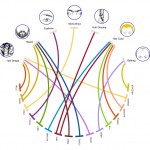Gray-haired men and women alike often wonder whether to dye their hair or leave it be. But a new option may soon be available, following a gene discovery that may allow for delaying, or even halting, gray hair growth.
An international study, published in Nature Communications and led by University College London, found for the first time a gene, IRF4, that influences the graying process.
“We already know several genes involved in balding and hair colour but this is the first time a gene for greying has been identified in humans, as well as other genes influencing hair shape and density,” writes Dr. Kaustubh Adhikari, the study’s lead author.
Past studies have linked IRF4 to hair color, but never before with hair graying. IRF4 governs melanin, the pigment responsible for the color of our eyes, skin and hair. When hair lacks melanin, graying occurs.
Scientists hope to understand just how IRF4 affects this process, as it could "be relevant for developing ways to delay hair greying," according to Professor Andres Ruiz-Linares, the corresponding author who led the study.
“These findings have potential forensic and cosmetic applications as we increase our knowledge on how genes influence the way we look,” says Dr. Adhikari.
The British Association of Dermatologists found in 2012 that over 70 percent of people between ages 45 and 65 have gray hair. Other studies have shown that over one-third of women over age 18, and 10 percent of men over age 40, use hair dye.
As studies show that hair dyes may contribute to cancers such as Non-Hodgkin’s Lymphoma, the cosmetics industry hopes to develop safer solutions to gray hair.
Some companies have introduced more natural products, while many look to instead modify hair color during its formation in the hair follicle. The possibility of a non-dye solution to graying holds great promise for both the companies and its customers.
In addition to IRF4, Ruiz-Linares' colleagues also found other genes linked to hair's color, density and shape. They looked at DNA samples of over 6,000 male and female volunteers in Brazil, Chile, Colombia, Mexico and Peru, comparing the samples to existing genome databases.
While previous research has sampled people of European descent, Dr. Adhikari says this new study "analyzed a diverse melting pot of people, which hasn't been done before on this scale."
In addition to graying solutions, the study's results could lead to advances in forensic DNA technologies and aid forensic reconstruction research in Latin America and East Asia. But much work still lies ahead.
"The genes we have identified are unlikely to work in isolation to cause graying or straight hair, or thick eyebrows," said Dr. Adhikari, speaking to UCL, "but have a role to play along with many other factors yet to be identified."




